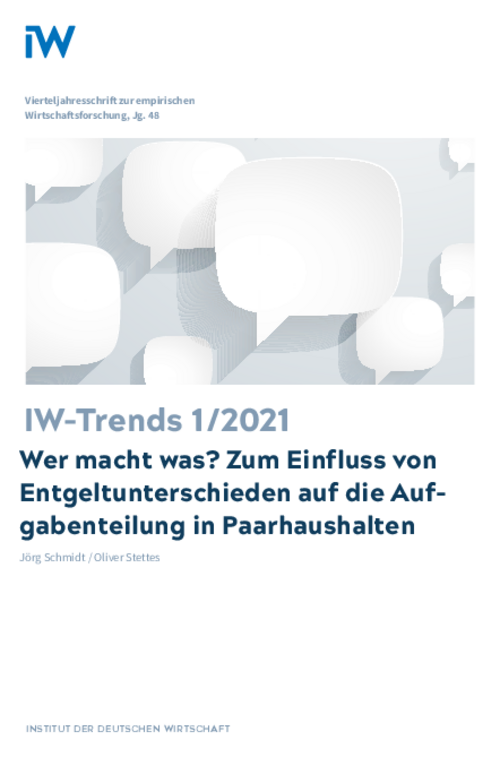The present study examines the effects of pay differentials in dual earner couple households on the amount of time that the partners assign to their professional activities and to domestic work. In the context of a gender-specific division of tasks, we investigate how much time the two sexes allocate to their occupations and to household tasks in relation to their partners.

Who Does What?: On the Impact of Pay Differentials on the Division of Tasks in Couple Households
IW-Trends

The present study examines the effects of pay differentials in dual earner couple households on the amount of time that the partners assign to their professional activities and to domestic work. In the context of a gender-specific division of tasks, we investigate how much time the two sexes allocate to their occupations and to household tasks in relation to their partners.
A woman's average gross hourly wage is 16.3 per cent lower than that of her partner when the pattern of task-sharing is more traditional. However, the female partner receives an average advantage of 6.6 per cent when the traditional roles are reversed. Both a positive age difference between the man and the woman and the existence of children are shown to support a more traditional specialisation. In the context of an economically motivated division of tasks, we analyse the extent to which the household member with the higher gross hourly wage spends more time at professional work and/or less time in household tasks than the other. When economic considerations underlying the division of tasks, the earnings gap between the woman and her partner averages 25.8 per cent. Econometric estimates show that existing wage differentials between the partners support economically motivated specialisation. Since women’s gross hourly wages are on average lower than their partners’, an economically motivated division of tasks often coincides with gender-specific specialisation. Economic considerations of couples can therefore reinforce a more traditional allocation of responsibilities that are already adopted before the birth of the first child.

Jörg Schmidt, Oliver Stettes: Wer macht was? Zum Einfluss von Entgelt-unterschieden auf die Aufgabenteilung in Paarhaushalten
IW-Trends

More on the topic

German Wage Policy between Inflation and Stagnation: Are Conflicts with the Aims of Monetary Policy Looming?
After the economic and financial crisis of 2008/9, the German labour market soon began to recover, creating scope for a comparatively expansive wage policy.
IW
The Pros and Cons of Trade Union Membership
The decline in collective bargaining coverage in Germany is often attributed to the reluctance of companies to join an employers' association which negotiates collective agreements.
IW